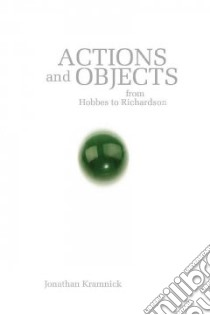Actions and Objects from Hobbes to Richardson - 9780804770521
Un libro in lingua di Jonathan Kramnick edito da Stanford Univ Pr, 2010
- € 28.10
- Il prezzo è variabile in funzione del cambio della valuta d’origine
"As a philosopher and cognitive scientist, I read Jonathan Kramnick's book with mounting excitement. Kramnick shows that earlier literary debates about the nature of mind, the person, and agency continue to shape our engagement with these topics today. He describes a world where there were no sharp lines between the work of theory and the work of the literary artist. Maybe it is time for us to bridge the gap that separates the concerns and methods of science and those of literature."---Alva Noe, University of California, Berkeley
"Working with grace, imagination, and rigor, Kramnick exemplifies the best of old-and new-fashioned scholarship in showing us an era embattled about the person as a material thing. This book, long awaited, will reward any intelligent reader who is willing to think."---Helen Deutsch, University of California, Los Angeles
"A compelling account of `the literature and philosophy of action.' Kramnick has the gift of making complex philosophical and theoretical issues both interesting and readily sortable. His lively tour of texts from Hobbes, Rochester, and Locke to Pope, Haywood, Trotter, and Richardson is intellectual history and literary criticism at its best."---J. Paul Hunter, University of Virginic
"Actions and Objects will set the standard in its fields for a generation. It is a serious and learned book whose subtle arguments and core wisdom will work their way into the collective consciousness of eighteenth-century literay studies, of the history of the philosophy of action, and of philosophical literary studies more generally."---Blakey Vermeule, Standford University
Actions and Objects examines how seventeenth-and eighteenth-century philosophers, novelists, poets, and scientists tried to account for human actions in a physical world. For some, states of mind like belief, desire, and emotion were part of nature---and thus subject to laws of cause and effect---while for others, the mind had a special place outside the natural order. Kramnick emphasizes writers who tried to make actions compatible with external determination and to blur the boundary between mind and matter. He follows a long tradition of examining the close relation between literary and philosophical writing during the period, but fundamentally revises the terrain. Rather than emphasizing psychological depth and interiority or asking how literary works were understood as true or fictional, he situates literature alongside philosophy as jointly interested in discovering how minds work.
Informazioni bibliografiche
- Titolo del Libro in lingua: Actions and Objects from Hobbes to Richardson
- Autore: Jonathan Kramnick
- Editore: Stanford Univ Pr
- Collana: Stanford Univ Pr (Paperback)
- Data di Pubblicazione: 30 Agosto '10
- Genere: LITERARY CRITICISM
- Pagine: 307
- ISBN-10: 0804770522
- EAN-13: 9780804770521


